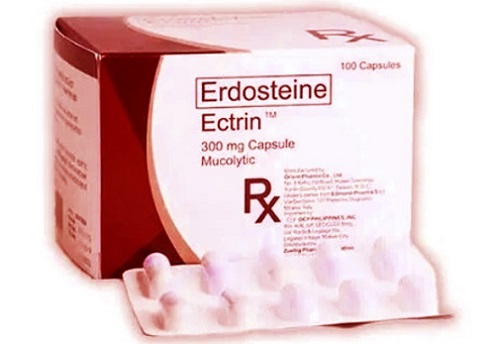Erdosteine Emerges as a Potent Weapon Against Deadly Respiratory Viruses Including SARS-CoV-2, RSV and Influenza A
Nikhil Prasad Fact checked by:Thailand Medical News Team Apr 17, 2025 2 days, 31 minutes ago
Medical News: Researchers from Italy’s Università degli Studi di Milano and Ospedale L. Sacco in Milan have discovered that an existing drug commonly used to treat respiratory diseases, erdosteine, also has powerful antiviral effects against several major human respiratory viruses—including SARS-CoV-2 (the virus that causes COVID-19), respiratory syncytial virus (RSV), and influenza A virus (H1N1). Their detailed laboratory study shows that this mucolytic drug can significantly reduce the ability of these viruses to replicate inside infected human cells, while also boosting the body’s own immune response and antioxidant defenses.
 Erdosteine Emerges as a Potent Weapon Against Deadly Respiratory Viruses Including SARS-CoV-2, RSV and Influenza A
Erdosteine Emerges as a Potent Weapon Against Deadly Respiratory Viruses Including SARS-CoV-2, RSV and Influenza A
This
Medical News report uncovers that erdosteine’s antiviral benefits are linked to its active form, a metabolite called MET-1, and its ability to modify how the body responds to infections at the molecular level. The findings come at a time when scientists are still searching for effective, broad-spectrum antiviral agents that are safe, affordable, and widely available.
The Science Behind the Study
The team conducted lab-based experiments using two different types of human cells: A549 lung epithelial cells engineered to express the ACE2 receptor (used by SARS-CoV-2 to enter cells), and Caco-2 colon cells often used to model influenza infections. These cells were infected with SARS-CoV-2, RSV, or influenza A (H1N1) viruses and treated either before or after infection with different concentrations of erdosteine or its active metabolite MET-1.
Importantly, the doses of erdosteine and MET-1 used in these tests were similar to what would be considered safe and standard in real-world clinical settings.
The researchers discovered that treating the infected cells after virus exposure led to strong antiviral effects. Erdosteine or MET-1 did not block virus entry, but they sharply reduced virus replication inside already-infected cells. Specifically:
-In SARS-CoV-2-infected lung cells, erdosteine reduced viral load by up to 91 percent
-In RSV-infected lung cells, viral levels dropped by 94.5 percent
-In influenza A-infected gut cells, virus replication fell by 47.5 percent
No antiviral effects were observed when the drug was given before the viral infection, indicating that erdosteine is not a preventative antiviral but an effective post-infection treatment.
How Does Erdosteine Work
The power of erdosteine lies in its ability to modulate the immune system and fight off oxidative stress—a type of damage to cells that occurs when the body is under attack from viruses.
Activation of Immune Genes
The study showed that erdosteine enhanced the activity of genes involved in the innate immune response, the body's first line of defens
e against viruses. These include genes that stimulate the production of type I interferons, essential proteins that help destroy virus-infected cells, and inflammasome components, which trigger further immune activation.
Key immune genes that were upregulated included ISG20, TLR4, HLA-A, CASP1, and CARD6, all of which play critical roles in fighting off viral invaders.
Oxidative Stress Control and Boosting Antioxidants
Erdosteine also appeared to protect cells by regulating oxidative stress. Viral infections like COVID-19 and RSV often lead to dangerously high levels of reactive oxygen species (ROS), which can damage DNA, proteins, and cell membranes.
Erdosteine helped suppress this stress by increasing the expression of antioxidant genes such as GPX2, CAT, and PRDX5, as well as genes linked to glutathione metabolism, a critical pathway for detoxifying harmful oxidative compounds.
By boosting glutathione levels and reducing oxidative injury, erdosteine helped restore a healthy cellular environment even during viral attack.
Anti-Inflammatory Effects and Cytokine Modulation
Inflammation is another major contributor to disease severity during respiratory infections, especially in COVID-19 where the “cytokine storm” can be fatal. This study revealed that erdosteine also moderated inflammation in infected cells.
Specifically, it lowered levels of IL-5, IFN-γ, and MIP-1β, three important molecules involved in inflammation and immune signaling.
While some inflammatory markers like IL-8 and MCP-1 were not significantly affected, the overall trend pointed toward a protective, anti-inflammatory effect of erdosteine.
A Potential Game Changer for Respiratory Infections
Erdosteine is already widely used in treating conditions like chronic bronchitis and chronic obstructive pulmonary disease (COPD), but this study now opens new possibilities for its use as a treatment for viral respiratory infections—especially when used early during infection.
Unlike most antiviral medications that target only specific viruses, erdosteine’s broad-spectrum action makes it a strong candidate for future pandemic preparedness. The drug’s ability to enhance the immune response and limit oxidative and inflammatory damage may provide an important therapeutic advantage, particularly in high-risk populations such as the elderly or those with underlying respiratory conditions.
It’s worth noting that erdosteine has also been shown in previous clinical trials (like the RESTORE study) to improve respiratory symptoms and reduce the duration of illness in people with COPD. These new antiviral findings may help explain some of those benefits.
Final Thoughts
The researchers emphasize that while these findings are exciting, the experiments were conducted in cell culture models and not in living patients. Human trials will be necessary to confirm whether erdosteine can offer similar antiviral effects in real-world clinical scenarios.
Still, this study adds to growing evidence that thiol-based drugs like erdosteine and N-acetylcysteine (NAC) may be powerful tools in the fight against respiratory viruses—not just for treating symptoms, but potentially for reducing viral load and stopping disease progression at the source.
Erdosteine’s multifaceted ability to fight viruses, regulate immune responses, and neutralize oxidative damage suggests it could play a vital role in future respiratory infection treatments.
The study findings were published in the peer reviewed journal: Pathogens.
https://www.mdpi.com/2076-0817/14/4/388
For the latest on Antivirals, keep on logging to Thailand
Medical News.
Read Also:
https://www.thailandmedical.news/news/the-phytochemical-carnosol-found-in-rosemary-destroys-influenza-a-virus-and-reduces-lung-inflammation
https://www.thailandmedical.news/news/antivirotics-based-on-defective-interfering-particles-a-new-frontier-in-targeting-viruses
https://www.thailandmedical.news/news/thailand-doctors-and-pharmacists-develop-potent-antiviral-formula-against-sars-cov-2-and-influenza-viruses
https://www.thailandmedical.news/pages/thailand_doctors_listings
https://www.thailandmedical.news/articles/hospital-news
